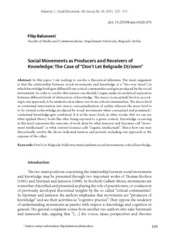Social Movements as Producers and Receivers of Knowledge: The Case of “Don’t Let Belgrade D(r)own”
Чланак у часопису (Објављена верзија)
Метаподаци
Приказ свих података о документуАпстракт
In this paper I am seeking to resolve a theoretical dilemma. The main argument
is that the relationship between social movements and knowledge is a “two-way street”, in
which knowledge both gets diffused from critical communities and gets produced by the social
movements. In order to resolve this tension one should, I argue, make an analytical separation
between different levels of abstraction of knowledge. The macro (conceptual) level is, according to my approach, to be understood as taken over from critical communities. The micro level
as contextual intervention into macro conceptualization of reality, whereas the meso level is
to be viewed as knowledge produced by social movements when conceptual and presumed /
contextual knowledge gets combined. It is at the meso level, in other words, that we can see
what applied theory looks like after being exposed to a given context. Knowledge occurring
at this level represents the outcome of work done by what Jameson and Eyerman call ...“movement intellectuals” or what Antoni Gramsci calls “organic intellectuals”. This is how one may
theoretically resolve the above-indicated tension and prevent excluding one approach at the
expense of the other
Кључне речи:
Don’t Let Belgrade D(d)own / municipalism / social movements / critical knowledgeИзвор:
АМ Часопис за студије уметности и медије, 2021, 26, 103-114Издавач:
- Факултет за медије и комуникације
Финансирање / пројекти:
- Министарство науке, технолошког развоја и иновација Републике Србије, институционално финансирање - 200025 (Универзитет у Београду, Институт за филозофију и друштвену теорију) (RS-MESTD-inst-2020-200025)
Колекције
Институција/група
IFDTTY - JOUR AU - Балуновић, Филип PY - 2021 UR - http://rifdt.instifdt.bg.ac.rs/123456789/2652 AB - In this paper I am seeking to resolve a theoretical dilemma. The main argument is that the relationship between social movements and knowledge is a “two-way street”, in which knowledge both gets diffused from critical communities and gets produced by the social movements. In order to resolve this tension one should, I argue, make an analytical separation between different levels of abstraction of knowledge. The macro (conceptual) level is, according to my approach, to be understood as taken over from critical communities. The micro level as contextual intervention into macro conceptualization of reality, whereas the meso level is to be viewed as knowledge produced by social movements when conceptual and presumed / contextual knowledge gets combined. It is at the meso level, in other words, that we can see what applied theory looks like after being exposed to a given context. Knowledge occurring at this level represents the outcome of work done by what Jameson and Eyerman call “movement intellectuals” or what Antoni Gramsci calls “organic intellectuals”. This is how one may theoretically resolve the above-indicated tension and prevent excluding one approach at the expense of the other PB - Факултет за медије и комуникације T2 - АМ Часопис за студије уметности и медије T1 - Social Movements as Producers and Receivers of Knowledge: The Case of “Don’t Let Belgrade D(r)own” IS - 26 SP - 103 EP - 114 DO - 10.25038/am.v0i26.474 ER -
@article{
author = "Балуновић, Филип",
year = "2021",
abstract = "In this paper I am seeking to resolve a theoretical dilemma. The main argument
is that the relationship between social movements and knowledge is a “two-way street”, in
which knowledge both gets diffused from critical communities and gets produced by the social
movements. In order to resolve this tension one should, I argue, make an analytical separation
between different levels of abstraction of knowledge. The macro (conceptual) level is, according to my approach, to be understood as taken over from critical communities. The micro level
as contextual intervention into macro conceptualization of reality, whereas the meso level is
to be viewed as knowledge produced by social movements when conceptual and presumed /
contextual knowledge gets combined. It is at the meso level, in other words, that we can see
what applied theory looks like after being exposed to a given context. Knowledge occurring
at this level represents the outcome of work done by what Jameson and Eyerman call “movement intellectuals” or what Antoni Gramsci calls “organic intellectuals”. This is how one may
theoretically resolve the above-indicated tension and prevent excluding one approach at the
expense of the other",
publisher = "Факултет за медије и комуникације",
journal = "АМ Часопис за студије уметности и медије",
title = "Social Movements as Producers and Receivers of Knowledge: The Case of “Don’t Let Belgrade D(r)own”",
number = "26",
pages = "103-114",
doi = "10.25038/am.v0i26.474"
}
Балуновић, Ф.. (2021). Social Movements as Producers and Receivers of Knowledge: The Case of “Don’t Let Belgrade D(r)own”. in АМ Часопис за студије уметности и медије Факултет за медије и комуникације.(26), 103-114. https://doi.org/10.25038/am.v0i26.474
Балуновић Ф. Social Movements as Producers and Receivers of Knowledge: The Case of “Don’t Let Belgrade D(r)own”. in АМ Часопис за студије уметности и медије. 2021;(26):103-114. doi:10.25038/am.v0i26.474 .
Балуновић, Филип, "Social Movements as Producers and Receivers of Knowledge: The Case of “Don’t Let Belgrade D(r)own”" in АМ Часопис за студије уметности и медије, no. 26 (2021):103-114, https://doi.org/10.25038/am.v0i26.474 . .



